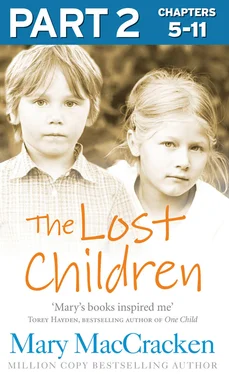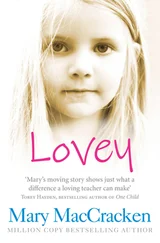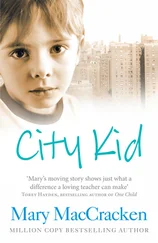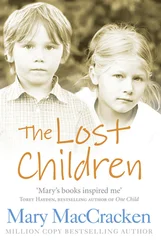For the first time I see a brass sliding bolt near the top of the door, and something inside of me is outraged. I may be new, I may be inexperienced, but I do not need to lock my children in a room to keep them there.
I smile at the man, still not knowing his last name, and say, “That’s all right. You just go on ahead. Thank you for bringing Chris,” and I see my brave, foolish words reflected in his gray eyes that are much like Chris’s.
I knelt on the floor beside Chris and put my arm around his waist. The father, in one swift movement, was out the door, holding it closed from the outside, peering in through the window.
Chris gave a tremendous lurch, trying to reach freedom, but my hand fastened on his belt and I held on, even as I toppled over and spread flat against the floor.
Damn that window, I thought, knowing that the father was watching – but I held on tight. It was important, what we were doing right then. We were establishing our code, our modus operandi , in this our first meeting and confrontation; our standards were being set. I would not lock the door. I knew if I locked it that first morning, it would be necessary to lock it each successive morning and afternoon – every time any of us went in or out. I did not want that. I wanted eventually to develop free access.
I did not think all this as I lay there on the floor: I just did not want to lock the door, and so I held on tight and said again softly, “Good morning, Chris. I’m glad to see you.”
I inched my way across the floor, never looking up, until I had my back against the door. Then I let go of Chris’s belt. He tore at the knob and rattled the door. I braced my feet on the tile floor and leaned my full weight against the door. At least, I thought, the man must be gone by now.
Chris stopped shaking the door and stood looking at me. Did he remember those times a year ago in Helga’s class? I thought I saw a flicker in the huge gray eyes, but I could not be sure.
“Hiya, Chris,” I say from the floor.
Momentarily he smiles, but it is so swift a smile that it ends long before it reaches his eyes. He moves back away from the door and for one long minute we look at each other – full, complete eye contact.
Then deliberately he takes off his coat and throws it on the floor. Is this what he always does and why there is no need for his name above a coat hook – or is he merely testing me?
I get up from the floor. “Hang it up, Chris.”
He laughs and runs and so I go and get him. There is no point in calling to him: he will not come and I want to make words meaningful, and so I go and get him a red crayon. There is no time to find labels and make neat lettering.
I lead him to the coat hooks and point to the hook farthest on the right.
“This is yours,” I tell him. “This is where you will hang your coat.”
He does not pull away from me now but stands silently as I write CHRIS in large red-crayon letters on the wall above the hook. Defacing church property? So be it.
“Get your coat, Chris. Hang it here.”
Wrong. He laughs and runs again.
I go and get him once again and we go together to the center of the room where his discarded coat lies on the floor and I take his hand and guide it to the coat – but he will not pick it up and instead slumps slack and boneless to the floor, laughing his shrill laugh.
I prop him up, my hand closes over his, and we take the coat and hang it on the hook beneath his name.
“Good for you,” I say.
But there is a tapping at the door and he does not even seem to hear me now. Instead, he finds two drumsticks in the wooden chest and takes them and climbs up on the jungle gym in the corner of the room, climbs until he reaches the highest platform – and there he folds his legs beneath him, and his mind inside him and his gray eyes look blankly down.
You are so small, I think. Seven years, and you cannot weigh more than fifty pounds. Your eyes seem bigger than the rest of you; they dominate your small, square face like diffuse gray clouds covering a sky … But I have watched and I have seen you be aware; I remember when your eyes would clear, lit from behind – and I will have more of this.
I go to the door to investigate the tapping. A stout woman is there, holding a large, curly-haired boy in her arms.
“Miss MacCracken?” Her speech is cultured, almost
English in articulation. “I understand that you will be filling in for Joyce. A tragic thing. Tragic. For her as well as for our poor children. Well, there’s nothing to do but make the best of it.”
She comes into the room, where Chris is beating a tattoo on the highest platform of the jungle gym, and stands the boy on the floor, takes off his red bonnet and mittens; then lays him on the floor and takes off his white shoes so that she can get the red snow-suit over his feet – unzips his overalls and feels inside his rubber pants.
“Oh, dear. He’s wet again. Never mind, I’ll fix it.” And she changes him there on the floor.
Then she rises and hands me the plastic bag of diapers, first removing two baby bottles full of milk, complete with rubber nipples.
“I’ll put these in the refrigerator for you, although I must say I don’t think much of that refrigerator. It must be at least five years old – not even a separate freezer so the poor children can have ice cream. Still, we mustn’t complain, must we? Now, the baby food is in the bag. It will be all right until you open the jars; then be sure to refrigerate it. Poor girl. It must be difficult for you to get the hang of things. Well, you can always call me. I’m never far from Bradford if he needs me.”
She kisses him then and calls to Chris, “Good morning, Christopher. Have fun with Bradford.”
She addresses me: “My, Christopher is athletic, isn’t he? Climbing way up there. Well, each of us has our own strengths. And the boys Christopher and Bradford do have such a marvelous time together.”
She left then before I could speak. Which was perhaps just as well. The only thing I could think to do was to look at Brad’s folder; perhaps I would regain some semblance of reality.
There it was. Brad. Bradford Turner. I checked the birth date. He was six years old.
My God, I thought, what kind of a class is this?
I was to find out later that this was the most difficult class I would ever teach, the hardest, the lowest-functioning. Four untoilet-trained boys, three of whom were nonverbal, ranging in age from five to eight. But I was unschooled – and while I knew it was somewhat different from Helga’s class, in my naïveté I thought, “Well, at least it’s a challenge. In a way, I’m lucky – there’s no way to go but up.”
Then in my mind’s ear I heard Helga’s voice, “You sound like a shitty Pollyanna. Get to work.” And I laughed out loud.
Louis was brought in by one of the women drivers and I recognized him immediately. If his name was not familiar to me, his blue football helmet was, and I remembered hearing the staff psychiatrist discussing him in Renée’s room. There was discussion as to whether he should be placed in her room for the remaining days. This would be his last year at the school; he was having multiple seizures now, sometimes as many as four or five in one hour. While it was never stated in words, most of us were sure these were epileptic in nature.
There was nothing much to do for Louis now except make sure his small football helmet was securely fastened to protect his head, should he fall beyond reach, and to cover him until he woke again after an attack. He was staying on at the school only until his parents could find a suitable residential setting for him. Some of the staff thought that it was wrong to keep him on in a school designed for the emotionally disturbed – wrong for him and an imposition on the teachers who had not been trained, and did not want to give the kind of custodial care Louis needed. But the Director wanted him there.
Читать дальше












